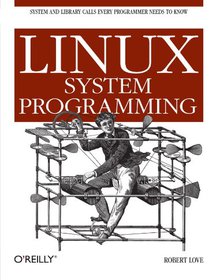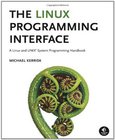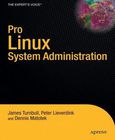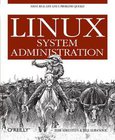Linux System Programming
Talking Directly to the Kernel and C Library

Book Details:
| Publisher: | O'Reilly Media |
| Series: | OReilly |
| Author: | Robert Love |
| Edition: | 1 |
| ISBN-10: | 0596009585 |
| ISBN-13: | 9780596009588 |
| Pages: | 392 |
| Published: | Sep 25 2007 |
| Posted: | Nov 19 2014 |
| Language: | English |
| Book format: | |
| Book size: | 2.41 MB |
Book Description:
This book is about writing software that makes the most effective use of the system you're running on -- code that interfaces directly with the kernel and core system libraries, including the shell, text editor, compiler, debugger, core utilities, and system daemons. The majority of both Unix and Linux code is still written at the system level, and Linux System Programming focuses on everything above the kernel, where applications such as Apache, bash, cp, vim, Emacs, gcc, gdb, glibc, ls, mv, and X exist. Written primarily for engineers looking to program (better) at the low level, this book is an ideal teaching tool for any programmer. Even with the trend toward high-level development, either through web software (such as PHP) or managed code (C#), someone still has to write the PHP interpreter and the C# virtual machine. Linux System Programming gives you an understanding of core internals that makes for better code, no matter where it appears in the stack. Debugging high-level code often requires you to understand the system calls and kernel behavior of your operating system, too. Key topics include: An overview of Linux, the kernel, the C library, and the C compiler Reading from and writing to files, along with other basic file I/O operations, including how the Linux kernel implements and manages file I/O Buffer size management, including the Standard I/O library Advanced I/O interfaces, memory mappings, and optimization techniques The family of system calls for basic process management Advanced process management, including real-time processes File and directories-creating, moving, copying, deleting, and managing them Memory management -- interfaces for allocating memory, managing the memory you have, and optimizing your memory access Signals and their role on a Unix system, plus basic and advanced signal interfaces Time, sleeping, and clock management, starting with the basics and continuing through POSIX clocks and high resolution timers With Linux System Programming, you will be able to take an in-depth look at Linux from both a theoretical and an applied perspective as you cover a wide range of programming topics.
Download Link:
Related Books:
The Linux Programming Interface
A Linux and UNIX System Programming Handbook
The Linux Programming Interface is the definitive guide to the Linux and UNIX programming interfacethe interface employed by nearly every application that runs on a Linux or UNIX system.In this authoritative work, Linux programming expert Michael Kerrisk provides detailed descriptions of the system calls and library functions that you need in order to master the craft of system programming, and accompanies his explanations with clear, complete example programs.You'll find descriptions of over 500 system calls and library functions, and more than 200 example programs, 88 tables, and 115 diagrams. You'll learn how to: Read and write files efficiently Use signals, clocks, and timers Create processes and execute programs Write secure programs Write multi...
Pro Linux System Administration
We can all be Linux experts, provided we invest the time in learning the craft of Linux administration. Pro Linux System Administration makes it easy for small- to mediumsized businesses to enter the world of zerocost software running on Linux and covers all the distros you might want to use, including Red Hat, Ubuntu, Debian, and CentOS. Authors, and systems infrastructure experts James Turnbull, Peter Lieverdink, and Dennis Matotek take a layered, componentbased approach to open source business systems, while training system administrators as the builders of business infrastructure. If you want to implement a SOHO or SMB Linux infrastructure, Pro Linux System Administration clearly demonstrates everything you need. Youll find this book also provid...
Linux System Administration
If you're an experienced system administrator looking to acquire Linux skills, or a seasoned Linux user facing a new challenge, Linux System Administration offers practical knowledge for managing a complete range of Linux systems and servers. The book summarizes the steps you need to build everything from standalone SOHO hubs, web servers, and LAN servers to load-balanced clusters and servers consolidated through virtualization. Along the way, you'll learn about all of the tools you need to set up and maintain these working environments.Linux is now a standard corporate platform with users numbering in the hundreds of millions, and there is a definite shortage of talented administrators. Linux System Administration is ideal as an introduction to Linu...
2007 - 2021 © eBooks-IT.org



